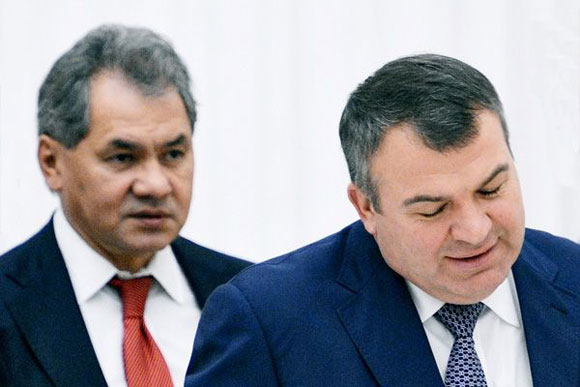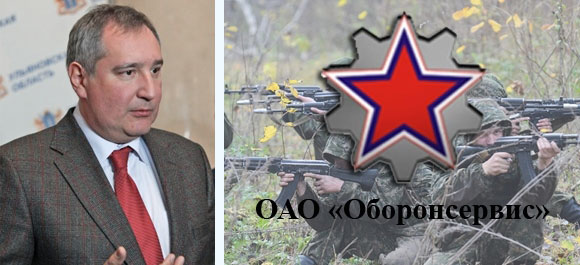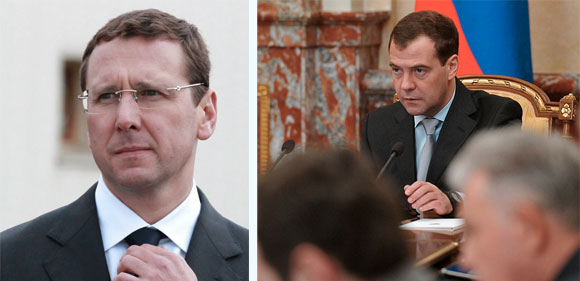The circumstances surrounding the recent dismissal of Russian Defense Minister Anatoly Serdyukov and his replacement with Sergei Shoygu (governor of the Moscow region and, prior to that, Emergency Management Minister) have put the crisis faced by the present Russian authorities in plain view. According to IMR expert Tatyana Stanovaya, this controversy indicates that Vladimir Putin’s regime is approaching its days of reckoning.

Governor of the Moscow region Sergei Shoygu (left) was made an offer he couldn't refuse—to replace the fired Minister of Defense Anatoly Serdyukov (right).
On November 6, Russian president Vladimir Putin abruptly replaced Minister of Defense Anatoly Serdyukov with Sergei Shoygu, governor of the Moscow region and formerly Emergency Management Minister. The actual reasons behind this reshuffle are still unclear. To the general public, Putin announced that this decision was due to the ongoing investigation into the activities of the management of OboronServis (DefenseService) Co., a firm whose creation in 2008 was initiated by Serdyukov and that played a significant role in the reform of the army. Detailed information about the circumstances of Serdyukov’s dismissal are unlikely to become known any time soon; however, this decision does reveal an array of systemic problems in the regime.
The replacement of Serdyukov with Shoygu highlights the symptoms of four kinds of crises that are developing within Russia’s political system. Let’s discuss each in more detail. Crisis number one concerns personnel recruitment. Serdyukov’s dismissal had been expected by observers for quite some time; many were surprised by the fact that he retained his post after Putin’s official return to the presidency. It is rumored that Putin discussed the possibility of replacing Serdyukov as early as April or May; these conversations supposedly occurred with Sergei Chemezov, chief of the government-owned corporation RosTechnologii, Putin’s closest confidant, and the man in control of the principal defense-related enterprises of the country. But no appropriate replacement for Serdyukov was found at the time. Contenders for the post included Chemezov himself, as well as Deputy Prime Minister Dmitry Rogozin, who oversees Russia’s military-industrial complex.
The dismissal of Serdyukov may be explained by a dozen factors. But the question of why he was succeeded by Shoygu rather than anybody else has only one rational answer: there were no other candidates.
Anonymous sources in the media reported that Sergei Shoygu was also mentioned at the time as a possible contender for the job. Shoygu is an official of remarkable political longevity. Back in 1990, he set up the Russian Rescue Corps, which was later used as the blueprint for the creation of the Emergency Management Ministry. Shoygu led this agency until 2012; under his watch, the ministry was transformed into a powerful system of emergency management, with a substantial armed component, as well as its own financial, organizational, and mobilization resources. The ministry had its own “army,” its own construction companies, its own towns and factories. Shoygu deserves credit for the fact that his ministry did not experience a single corruption-related scandal during his tenure. For many years, Shoygu was considered the second most popular politician (after Putin), with a virtually untarnished reputation.
Why was it that in April 2012, then-president Dmitry Medvedev nominated Shoygu for the job of Moscow city governor rather than for Minister of Defense? One can only guess. Most likely, the lobbyists for the military-industrial complex were unprepared for his candidacy: they dreamed of placing their own representative in this position, although Putin was not very enthusiastic about the prospect. But at this point, one can confidently say that Putin’s decision to move Shoygu to the position of Defense Minister was spontaneous and poorly thought-out.
As a matter of fact, the situation in which a political leader is compelled to make a decision under external pressure (as in the case of the investigation of OboronServis) rather than on the basis of a long-term strategy exemplifies a personnel recruitment crisis. Putin found himself facing conditions under which it was difficult not to respond, given that even the most seasoned anti-corruption crusaders were impressed by the extent of the theft in OboronServis. It is probable that Rogozin acted as the trigger in this situation, displaying as much political will as possible in pursuing the case against the Minister of Defense. Some have also identified Shoygu as the initiator of Serdyukov’s dismissal: the latter literally quarreled with Shoygu at a June interagency meeting presided over by Medvedev. At this meeting, Governor Shoygu demanded the transfer of army settlements in good repair and with functioning social services to the Moscow region; Serdyukov retorted, in an adversarial manner, that there was no money to pay for it, and that nothing new was going to be built.
However, all this was routine politics. Neither Shoygu nor Rogozin, no matter how zealously they sought Serdyukov’s dismissal, would have been able to succeed on his own. There are only two officials capable of deposing the Defense Minister: the aforementioned Sergei Chemezov—who, by the way, is also interested in the Prime Minister’s job—and Igor Sechin, one of Putin’s closest comrades-in-arms, who presides over the oil corporation Rosneft. However, while Sechin was busy building up his oil empire by acquiring TNK-BP, Chemezov remained the only interested and capable player with an opportunity to make a move against the Defense Minister. The companies of the military-industrial complex (many of which are under Chemezov’s control) were embroiled in a sharp and extensive conflict with Serdyukov over prices, the timing of supplies, and the quality of their production. The military-industrial complex wanted to sell its products to the Ministry under guaranteed government orders at a high price, with minimal effort and as permissive production deadlines as possible. Serdyukov demanded cheaper and faster manufacturing—and, for the first time in Russian history, he started spending millions of dollars to purchase military equipment abroad.

As Deputy Prime Minister Dmitry Rogozin has reported, OboronServis and its affiliated structures had been neglected by the government.
The dismissal of Serdyukov may be explained by a dozen factors. Meanwhile, the question of why he was succeeded by Shoygu rather than anybody else has only one rational answer: there were no other candidates. It is quite possible that the reasoning in the Kremlin was as follows: a professional soldier at the helm of the Ministry would likely fail to implement the reforms that were more or less successfully pursued by Serdyukov at a time when the urgency of modernizing the Russian army equals the urgency of pension reform; meanwhile, the appointment of a representative of the military-industrial complex to head the Defense Ministry would entail a considerable risk of inefficient spending of budgetary funds through additional government orders to the industry. Furthermore, appointing a civilian as Minister of Defense was also risky, as it could lead to a repeat of the situation under Serdyukov.
As a result, the Kremlin had to look for a candidate who was palatable to the top brass of the army, independent of the military-industrial complex, and organizationally efficient. And there turned out to be only one such candidate: Shoygu, who was simply transferred from one lackluster job (governor of the Moscow Region) to another. Such an outcome demonstrates the crisis of Putin’s personnel policy. It is important to note that Shoygu is not exceptionally close to Putin—he is not a member of any clan and comes close to being a potential competitor to Putin: the new Defense Minister is among the few who may be viewed by the population as a realistic alternative to Putin.
The second crisis of the Putin regime is a crisis of the populist strategy of governance. The regime was able to pursue military reforms, which were extremely unpopular in the Russian army, for only five years. For these five years, these reforms (which remain incomplete) were the product of strategic, long-term choices of the Kremlin—meaning, in this case, both Putin and Medvedev. Most of the unpopular decisions regarding the army were made under Medvedev. As for Shoygu, he has already started to rescind many of the decisions made by Serdyukov, albeit so far only those that had merely symbolic significance. Thus, the orders issued by the new minister include the reinstatement of the cadets of the Suvorov and Nakhimov Military Schools as participants in the annual military parades in honor of Victory Day on May 9th; the suspension of the ongoing transfer of the Military Academy of Medicine from central St. Petersburg to the outskirts of the city; and the annulment of the decisions to close several military schools.
For many years, Putin simply looked away, believing that if someone did his job well, then corruption was just a byproduct of that work. At this point, however, government officials are failing in their jobs—and continuing to steal at the same time. The system thus fails to carry out its basic functions, and the state is beginning to decay.
What is occurring—a revision of the strategic choice in favor of military reform as a result of a recognition that the decisions of the past five years were mistaken? Or is it a lack of clarity about the direction that needs to be taken? Most likely, the reasoning of the authorities in this case is more simple: the implementation of unpopular reforms engenders too many internal conflicts—with the officers who are losing their jobs; with the generals whose economic activities are being placed under government control; and with the military-industrial complex, as discussed earlier. These reforms are becoming an irritant for the society at large. Serdyukov was among the most unpopular ministers in Putin’s cabinet, and arguably the most unpopular in Medvedev’s cabinet. Even without this irritant, the Putin regime is entering a period of heightened social and political risks, and the president is being forced to retreat under the pressure of influential groups in both Russian society and the government bureaucracy. The policy of “Let them steal as long as they are loyal” is not working any longer; it has now yielded to a policy of keeping things quiet—avoiding conflicts regardless of the resulting inefficiencies. Furthermore, it is now not enough to demonstrate political loyalty—it must be guaranteed: thus, the Kremlin has demanded the repatriation of the funds that the Russian establishment has kept in foreign bank accounts.
The third crisis that the regime is facing is a crisis of the Medvedev cabinet. This cabinet, which is politically weak but to a certain extent autonomous vis-à-vis Putin, is in a period of instability. It has lost its Minister of Regional Development, Oleg Govorun, who resigned in the midst of a scandal, after a disagreement over being dressed down in public by President Putin for allegedly making decisions that he had not in fact made. Putin ordered Medvedev to punish Govorun and three other ministers for having signed off on a draft budget that failed to reflect the president’s decrees. These decrees, signed in May, instructed the cabinet to carry out Putin’s election promises. Govorun had virtually nothing to do with this budget, but he was made into a scapegoat. As a former official of the presidential administration, he was not accustomed to such treatment and was shocked by it, while Medvedev turned out to be incapable of defending his minister. All of the cabinet members currently face the same situation, and they realize that it is virtually impossible to work under such conditions.

As many media reported, Minister of Regional Development Oleg Govorun (left) wrote a letter of resignation right after he had been told off in public by President Putin, but then, all of a sudden, Minister was reported to be on a sick leave. Almost a month later, the intrigue was finally resolved, as Govorun's resignation was officially confirmed. Some analysts point out that Govorun's departure has significantly weakened Dmitry Medvedev's position as head of Russian government.
The de facto disappearance of Medvedev as a political factor also played a significant role in the dismissal of Serdyukov, who had benefited from Medvedev’s support for four years. After the September 2011 congress of the United Russia Party that announced Putin’s return to the presidency, Medvedev ceased to exist as a political player who deserved any attention. Such a leader is prone to lose the respect of even his own ministers. This was clearly reflected in the tone used by Serdyukov in talking to the prime minister at the June session mentioned earlier. Members of Medvedev’s cabinet often behave like children in a troubled school where the teacher is unable to maintain order. It’s not that the students are bad—it’s just that the teachers are held in low esteem.
Finally, the fourth kind of crisis faced by the regime concerns its ineffectiveness. Corruption is on the rise, and it looks like curbing it is not even an official priority of the Kremlin. Instead, Putin increasingly mentions “other countries” where “they also steal,” which looks like an attempt to justify the present situation instead of trying to improve it. Everyone steals—people from the inner circle and their friends, the friends of their friends, and members of their nuclear and extended families. For many years, Putin simply looked away, believing that if someone did his job well, then corruption was just a byproduct of that work and was not worth noticing. At this point, however, government officials are failing in their jobs—and continuing to steal at the same time. The system thus fails to carry out its basic functions, and the state is beginning to decay.
The Serdyukov story contains yet another revealing aspect. Whatever his personal or professional qualities might be, Serdyukov (who is a relative of former prime minister Viktor Zubkov and has never been personally close with Putin) was sacrificed by “the system.” Russian government agencies have experienced a fair number of high-profile corruption-related scandals. These scandals have involved both people close to Putin and those who are distant from him but are nevertheless integrated into the system. Serdyukov was of the second kind. Both Putin and Medvedev were indirectly responsible for his statements and decisions. Now he has not just been dismissed, but his closest associates may end up sentenced to actual jail terms, and he himself might also turn from a witness to a defendant. An energetic denunciation campaign of Serdyukov is unfolding on government TV channels that is reminiscent of prior campaigns against “enemies of the people”—that is, the opposition. The system has sacrificed one of its own. This is not merely a crisis of the regime: this is the beginning of its end.

